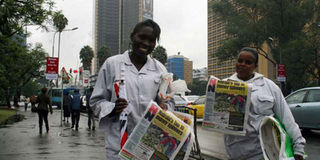The Nairobi vendor and roast maize: A parable of our times

Vendors copies of the Nairobi News newspaper along Kenyatta Avenue in Nairobi on November 20, 2013. PHOTO | WILLIAM OERI | NATION MEDIA GROUP
What you need to know:
- There is something nostalgic about roast maize and groundnuts, and an elusive spiritual connection to our African past.
- There is a raw defiance and a primitive edge to roast maize that is hard to put a finger on, but its power is undeniable.
- The educated fellows of that time who had some money to spare took things like reading newspapers very seriously, so they bought subscriptions.
A few days ago newspaper vendors were allowed to return to work on the busy Uhuru Highway in Nairobi. All hawkers (or itinerant traders - in elegant pro-free trade language) had been barred, after motorists complained about rising crime. Now they are back after two weeks, and will have to wear uniforms, badges, and all that.
Probably a sensible move. This is a defence of three types of hawkers. I know that a journalist writing in solidarity with newspaper vendors sounds shamelessly self-serving.
It is like the monkey being a character witness in a case against the forest. But we shall not utter a single word in defence of press freedom. This is also about the hawkers who sell roast groundnuts in the traffic, and the wonderful fellows who roast maize by the roadside.
Hawking newspapers along the streets and in traffic is a relatively new thing in Africa, and indeed, most of the world. When I was young – though that was in the last century it was not really long ago – I wasn’t aware that newspapers were sold on the streets.
We would ride to the post office near our house, and get the old man’s newspapers, and magazines like Drum and the wonderful illustrated James Bond-imitation action periodical Lance Spearman (with the villain Rabon Zollo, and the beautiful secretary Sonia).
The educated fellows of that time who had some money to spare took things like reading newspapers very seriously, so they bought subscriptions. It was so extreme in some countries, especially outside Africa, I remember visiting the leading newspaper in Bonn, Germany, with a circulation of nearly 800,000 in 1992, and a mouth-watering 98 per cent of its sales were subscriptions.
SHIFT OF POWER
The other two per cent, they put out in newsstands in places where there was heavy tourist traffic, specifically for them.
Then the airwaves were liberalised, many FM stations opened, independent TV stations cropped up, the Internet arrived, the mobile phone landed, and the media business went to hell in a basket.
Previously, the Muhammad (readers/buyers) went to the mountain (newspapers). Today, the mountain is on its knees before Muhammad. The newspaper vendor (beyond enabling journalists to put food on the table and shareholders to grow rich) represents that very important social change, and the attendant shift of power to masses.
To the extent that our civilisation’s survival depends on an informed citizenry, newspaper vendors are unique that they are the only people who stand in the sun for hours, endure being ignored by thousands, to hawk a knowledge product that has such existential value – for such small profit margins.
That is where the hawkers who sell roasted groundnuts and maize come in. Because of changing lifestyles, especially among the middle class, roasted maize and groundnuts have moved from the home to the market.
You can’t really roast maize on an electric or gas cooker. It has been replaced by the steamed – and buttered (!) – version.
There is something nostalgic about roast maize and groundnuts, and an elusive spiritual connection to our African past.
FLEETING MOMENT
For most Africans alive today, perhaps the one thing that we do the same way our forefathers did is roast maize. Almost everything else, from the way we brew, the way we marry, the way we pray, how we cook, how we fall in and out of love (even before we talk of breaking up via WhatsApp), the way we dress, and sing and dance, have changed. Some of them very radically.
There is a raw defiance and a primitive edge to roast maize that is hard to put a finger on, but its power is undeniable.
You get the same feeling when you are driving in a leafy Nairobi suburb and you come across cattle walking along the street, the herdsboy with his stick by their side, totally oblivious to the traffic jam they are causing. Or, one day, in your upmarket neighbourhood, you are woken by a loud raucous of cocks crowing in the morning.
It might be for a fleeting moment, but you will get that sense of “I think I know who I am”.
Newspapers, roast maize, and roasted groundnuts, all have one thing in common. To avoid death, they came to the streetlights (joined soon by preachers seeking lost souls). Looked at that way, newspaper vending is an act of salvation.
The author is publisher of Africa data visualiser Africapedia.com and explainer site Roguechiefs.com. Twitter@cobbo3





